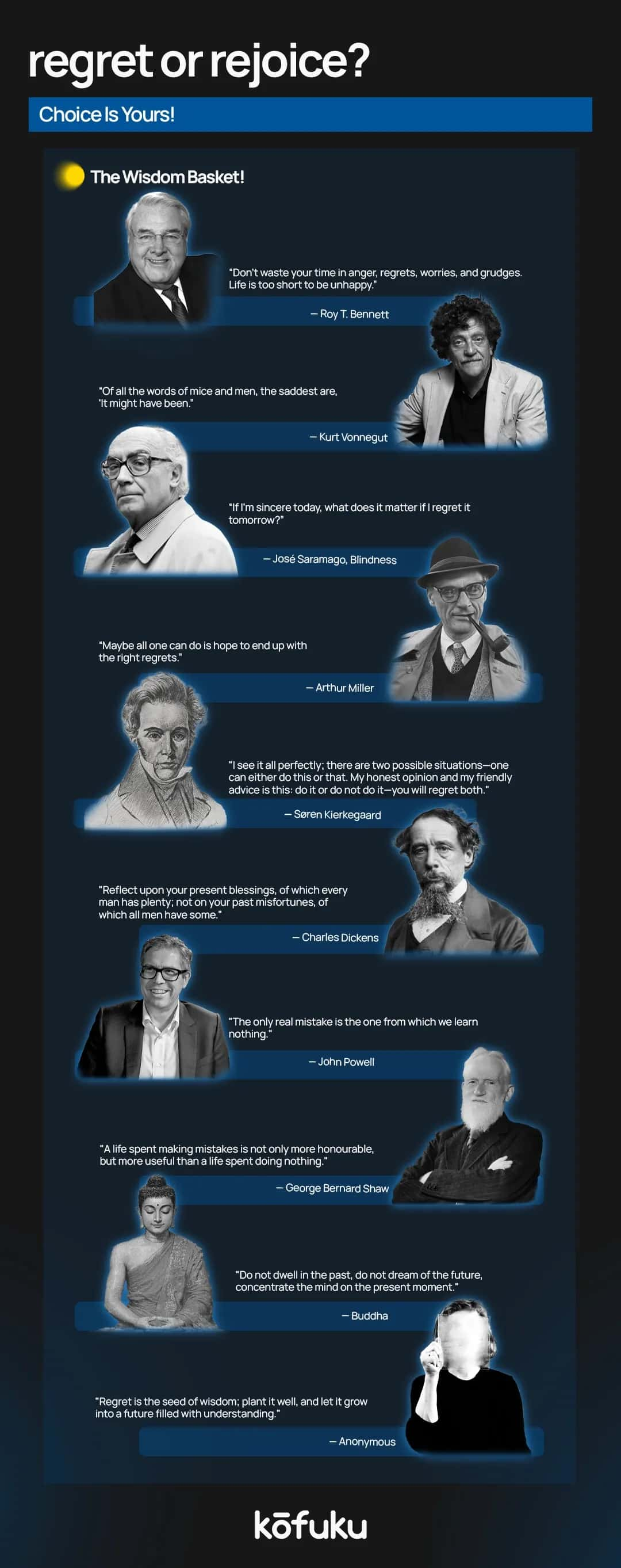10 Ways to Let Go of Regret


Introduction
So, there I was at 3 a.m. when spirits take a stroll (I'm just kidding!), lying in bed, staring at the ceiling, mentally replaying that one embarrassing thing I said in class, almost a few years ago. You know the drill: regret hits you like a late-night text from your ex, except this one gets on your nerves.
It pops up when you’re trying to sleep, mid-shower, or peacefully sipping your chai like a civilised adult. Suddenly, bammmmm!! Your brain says, “Remember that dumb thing you did in 2018?”. And now you’re wide-eyed, spiralling, and wondering if time travel is a thing yet.
The good news is you don’t have to be haunted by every awkward situation, missed opportunities, or extra slice of cake you ate in the heat of the moment when you said you were on a diet.
Regret is human nature. The funny thing is, getting over it is also a normal human process, i.e., if you let it. So, without further delay, let’s get into the 10 ridiculous but surprising ways of letting go of regret with Kofuku.
Accept the past, no matter what
Moving on from an embarrassing or sad situation can always be difficult, but again, it has already happened. We tend to cause ourselves more harm by dwelling on the past.
Constantly replaying and thinking about a better outcome and regretting everything causes stress to our nervous system and brain.
You might feel lethargic, sudden bodyache, and even have a migraine with the severe stress caused by regret. And chances are, you are missing out on great opportunities because you’re still haunted by your failures of the past.
Self-forgiveness is the key
Forgive yourself like you would forgive your best friend in a heartbeat. Regret is a manifestation of unforgiveness that you have bestowed on yourself.
Oftentimes, we don’t realise we are being harsh to ourselves by putting our mistakes under a microscope and constantly judging and living with the guilt.
The first step of letting go is forgiving yourself and setting yourself free from shame and guilt.
Humans make mistakes
Accept your flaws. Making mistakes is human nature, out of our control, and feeling things is completely normal. Strive for self-acceptance. Your mistakes aren’t what should define your character or the next step in your life.
Reliving events and feeling regret isn’t doing you or anyone else any good, so try to let go.
Noah’s Ark - We’re all in this together
First things first, you’re not alone in feeling this way. Someone or the other right now must be recalling how they tripped in front of their crush or forgot to pay the bill and walked off.
Regrets could be tiny or big, but at least we’re sailing in the same boat, and that should ease our minds a little.
Regret Resume or Letter - A Real Thing
Do yourself a favour and write a long, dramatic letter to yourself. Start with “Dear Past Me” and go full Bollywood drama. Cry, rant, blame Mercury in retrograde, anything works.
And to spice (wink wink) things up, do it in the most British posh accent you can or pretend you’re narrating a soap opera.
Regret loses its power when you turn it into a performance act.

Think of it as your Character Development Arc
Sure, we’ve all messed up. But isn’t that what all great protagonists do before they become wise and charming? So, congrats, you’re in your growth era, and you will probably learn something from this as a lesson.
As Friedrich Nietzsche said, “What doesn’t kill you makes you stronger.” Your regrets are unknowingly making you emotionally stronger.
Retrieved “What not to do Guide” hack
Take it as a guide. Think of regret as a super-intense teacher with no chill. We’ve all encountered at least one in our lives. Use this method: Jot down what you’ve experienced and learned so next time, you know what to avoid.
You could be wise, giving advice like a seasoned philosopher (with snacks).
Share it with your friend
Bottling up emotions isn’t helping. Even if it’s something really embarrassing that's making you regret it, let it all out. Talk to your closest friends, come to terms with it.
And who knows, ya’ll might just come up with inside jokes and even get one or more trolling from your friends.
The funniest thing about it is that this topic could be a highlight during reunions or weddings after parties, and you just laugh it off.

Understand that regret radiates negative energy
People believe that crystals provide positive energy, and they meditate and try yoga to get the most out of them, which is fair!
Similarly, we need to understand that every little thing or emotion blends so easily into our mere human life. Regret robs us of the path of good energy.
Our minds are constantly battling with decisions and feelings. One minute you are sad, and the next minute, infuriated. It snatches your energy away; at the same time, you are sleepless, no peace, and laughter is a long-lost friend.
Be confident while letting it go
Healing takes a lot of time, because regrets don’t go away on their own. It’s not like a hangover after a wild party that can be cured. Pay attention to your feelings and take rightful actions.
Make sure your slate is clean completely, because regrets can creep into your life like that cockroach you thought you got rid of. Don’t let regret hover around you, accept your mistakes, and face the repercussions.
Have a fresh start, confidently.
Conclusion
In the end, regret is just like glitter; it lingers, and is downright annoying, but eventually fades (especially if you have vacuumed your brain with humor and perspective).
But in all seriousness, ask yourselves, would this regret even matter five years from now, will they remember how I walked on a closing lift and tried to act as nonchalant as possible with a clearly visible scratch on the elbow.
So stop rewinding, laugh at the mess, learn from it, and gradually take a leap (move on).
FAQs
Q. What is regret, and why is it so hard to let go of?
A. Regret is an emotional response to a past decision or event where you feel you should have acted differently. It's hard to let go because it often involves guilt, shame, or sadness.
Q. Is it normal to feel regret years after something happened?
A. Absolutely. Regret doesn’t have a timeline. It can resurface even years later, especially if something reminds you of the event or you face similar choices. Healing is nonlinear, and that’s okay.
Q. How can I stop overthinking past mistakes?
A. Try these techniques: mindfulness meditation to stay present, asking yourself what you learned from the experience, writing out your thoughts to release mental loops, and, lastly, limiting the “what ifs” by focusing on what you can control now.
Q. How can I forgive myself for a past decision?
A. Start by acknowledging what happened without denial, taking responsibility, and making peace that you did your best with what you knew then.
Q. What are healthy ways to process regret?
A. Talk it out with a friend or therapist, remind yourself that everyone makes mistakes, and engage in acts of service to shift focus and create positive outcomes.





